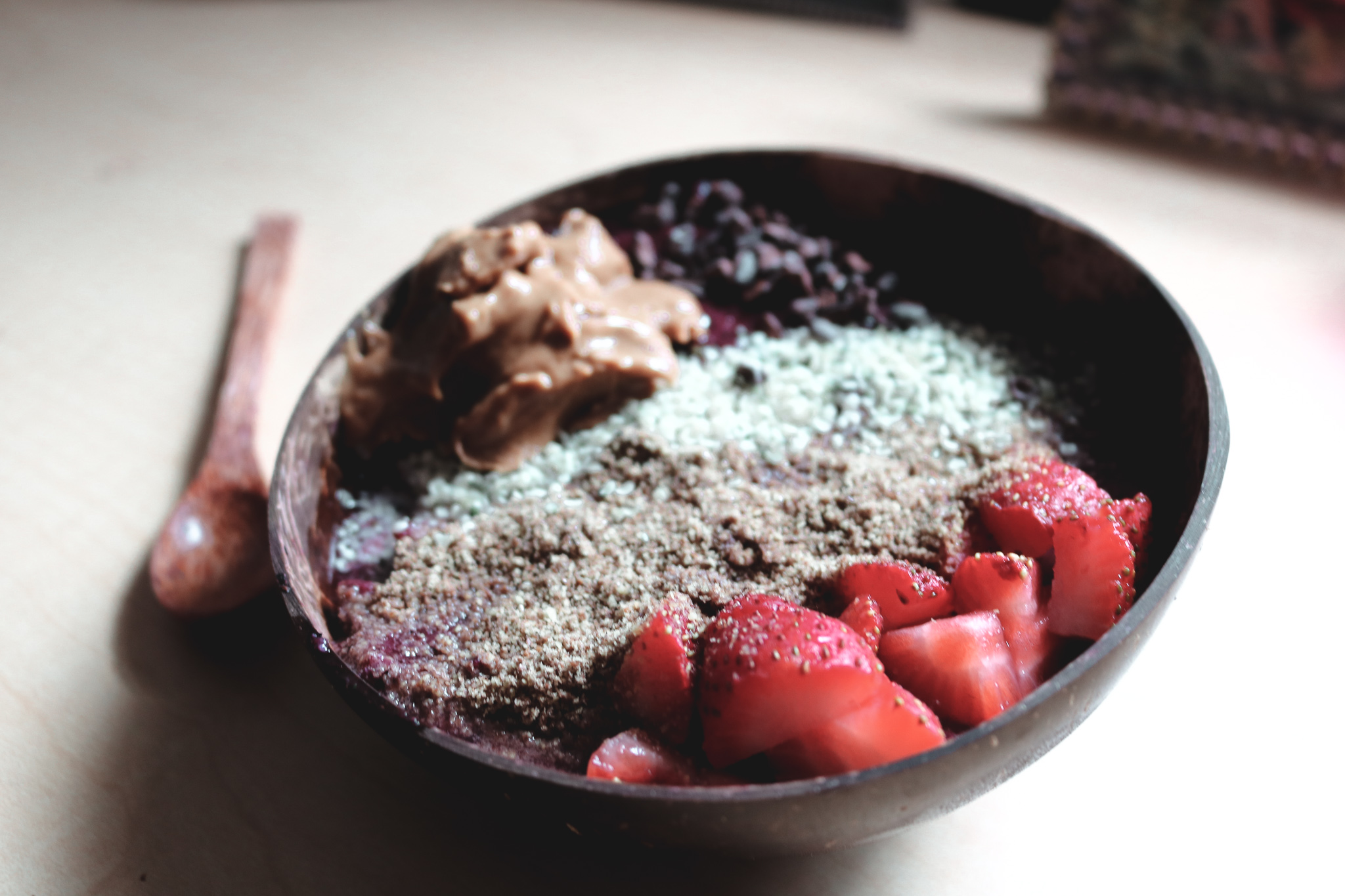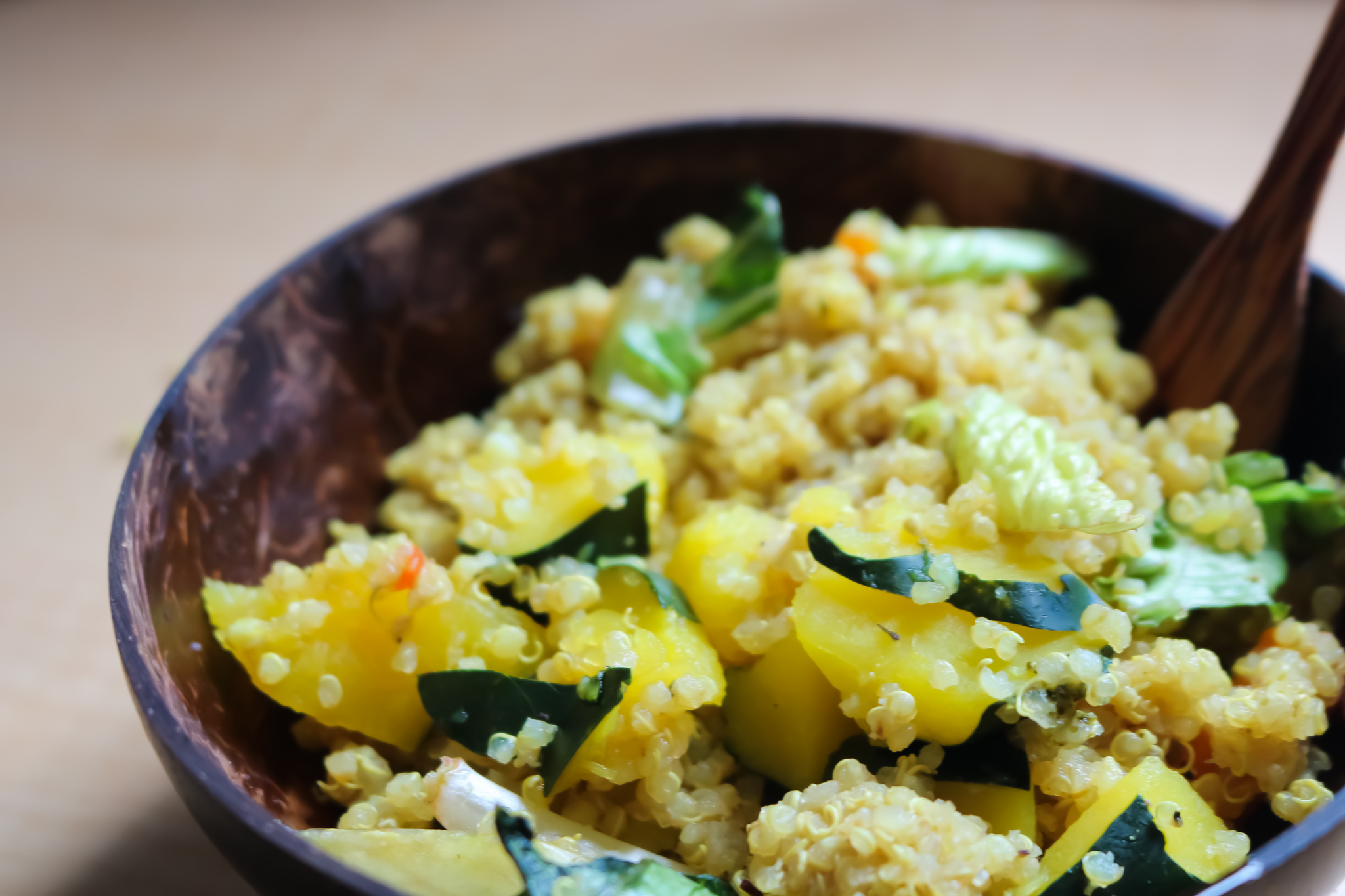One of the most common questions I get as a personal trainer is what to eat before and after a workout. This question is common for good reason–what you eat before and after exercise is almost as important as your workout itself. We’ll go over what to eat and why with tons of recipe examples!
What to eat before a workout

The most important macronutrient to eat before you workout is carbohydrates. Carbs provide energy in the form of glucose, which is converted to chemical energy in your body through cellular respiration (high school biology, anyone?)
It’s best to consume fast-acting carbohydrates before working out because these carbohydrates maximize blood glucose availability, making it easier for muscle cells to obtain glucose from the blood to convert into energy. Examples of fast-acting carbohydrates include: dried fruit, fruit juice, fresh fruit, granola bars, etc.
Can you workout on an empty stomach?
If you prefer to workout on an empty stomach, that’s totally fine. There is not a ton of evidence to show that working out with an empty stomach decreases performance, although you may be more likely to run out of energy or “hit a wall” during your workout. The possible benefit to working out in the morning before you’ve eaten is that you minimize gastrointestinal distress because you won’t need to worry about digesting food before you work out. I personally prefer exercising in the morning on an empty stomach, but feel free to have a small snack or exercise later in the day if that works better for you. It’s a personal preference!
Do you need a pre-workout snack?
If you’ve been to the gym or on Instagram, you’ve probably seen those bright little shaker bottles with liquid pre-workout supplements. A lot of people swear by them and they’re promised to do everything from enhance performance to assist with weight loss or weight gain or even speed muscle recovery.
Check any supplements you’d like to take with your doctor. However, the American Dietetic Association advises against individual amino acid supplementation (i.e. BCAAs or Branched Chain Amino-Acids, which you’ll see in most pre-workout drinks) due to the inconsistency of research and lack of safety and regulation for these products. Pre-workout drinks are typically very expensive and contain a number of hidden sweeteners, fillers, dyes, etc, so it may come as a relief that you don’t need to spend that $60 on pre-workout after all.
Does caffeine enhance athletic performance?
On the other hand, if your pre-workout drink contains caffeine, then it might just improve your exercise performance. Caffeine is actually the best known pre-workout “supplement”–it enhances athletic performance. If you think your pre-workout is really helping, it’s probably the caffeine. You can save money by just drinking a cup of coffee or tea instead.
The catch here is that caffeine enhances performance much more for those who are not regular caffeine users. I personally find caffeine to be a great occasional boost rather than a workout essential.
How long should you wait after eating to work out?
It’s generally recommended to wait at least three hours after eating a full meal before exercising. Exercising before your food is digested can result in gastrointestinal distress.
Some people may be able to eat a small snack before exercise (see above) without any symptoms. Others might get a cramp if they eat even a granola bar before working out. This is highly individual so find what pre-workout eating routine works best for you.
What to eat during your workout
If your exercise session is under one hour long, you very likely will not need to eat during your workout (of course, always listen to your own body!) If you’re training for endurance and working with sessions over an hour long then you’ll want to consume 30-60 grams of fast-acting carbohydrates (i.e. fruit, dried fruit, juice, etc.) per hour of training.
What to eat after your workout

What you eat after a workout is incredibly important for recovery and muscle growth. Proper post-workout nutrition is one of the essential steps to recovering properly from your workout to meet your fitness goals.
You’ll want to consume a mixture of protein and carbohydrates after an exercise session. The protein serves to help the muscles rebuild and repair after muscle tissue is broken down during the workout. The American Dietetic Association recommends 0.8 kg of protein/g of body weight per day and there is no official recommendation for how much protein to eat after a workout, so try to consume some protein right after a workout and work toward your daily amount.
Vegan sources of protein include legumes like beans, peas, and lentils, nuts like hazelnuts, walnuts, and almonds, and seeds like sunflower seeds, hemp seeds, and pumpkin seeds.
The carbohydrates in your post-workout meal help replenish the glycogen in your muscles and blood. Your body actually keeps some glycogen (the stored form of glucose) in your muscles for quick energy before your blood can send glucose to the muscles. Eating carbohydrates after exercising replenishes the glycogen stored in your muscles for the next time you need that boost of cellular energy. You can eat slower-digesting carbohydrates after your workout (although quick carbs are fine too!) such as rice, oats, bread, or starchy vegetables.
How soon after workout out do you need to eat?
It’s ideal to refuel within 30 minutes of exercising, but this isn’t always possible. If you can’t get that snack or meal in within 30 minutes then just aim to eat as soon as possible.
Do you need to drink a protein shake?
Protein shakes are very well-marketed (something you can put in your smoothie that will build up your muscles? Sounds great!) but they are not necessary. Research is unclear whether or not protein supplementation enhances the benefits of exercise, so the American Dietetics Association recommends against protein supplementation overall. Again I am not looking to give individual advice (check with your doctor for individualized supplement recommendations) but I want to relay the most credible general health information possible.
If you do really want to supplement with protein, make sure that it’s vegan. I would also check the ingredients to ensure that they are as clean and whole as possible; many protein powders have hidden sweeteners, fillers, and other chemicals.
Post-workout food ideas
- Vegetable rolls with Thai peanut sauce– The carbohydrates (and micronutrients!) in the veggies and rice paper wrap and protein in the peanut sauce make spring rolls a refreshing and nutrient-dense post-workout snack.
- Vegan black lentil salad– I’m a huge fan of salads; they’re such a great way to get nutrients in! Adding protein like lentils to salads boost satiety and helps your muscles repair.
- Strawberry spinach chickpea salad– Celebrate summer with a strawberry salad! Chickpeas are an amazing source of both protein and iron.
- Curried coconut veggies with falafel crumble – If you’re a spice fan like me, you’ll love making curried vegetables. The falafel adds a boost of protein!
- Vegan lentil salad with croutons and Dijon vinaigrette – This salad recipe is perfect for any weather and packs a bunch of protein and nutrients!
- Vegan high-protein cookie dough bars– Dessert that also helps you recover post-workout? Sign me up! This recipe boasts chia seeds, chickpeas, oats, and almond butter – all great sources of protein!
- Sprouted lentil and avocado sandwich– Again, lentils are a great source of protein. Plus, they (along with other legumes such as beans, peas, etc.) are consideredto be the most important dietary predictor of survival in older adults!
- Peanut butter and jelly smoothie bowl– This smoothie bowl is one of my favorite breakfasts! Peanut butter and hemp seeds provide protein while all the fruit in a smoothie is ideal for replenishing glucose stores.
- Tofu scramble– Tofu scramble is a great high-protein savory breakfast (although I wouldn’t blame you for having it every meal!) Add some starchy veggies to the side for more carbohydrates!
- Chana masala– This is my favorite Indian dish! Thanks to the chickpeas and rice or bread that it’s usually served with, chana masala is an amazing post-workout meal.
I hope that this was helpful! Go crush those vegan gains:)
What’s your favorite post-workout meal?




